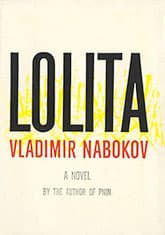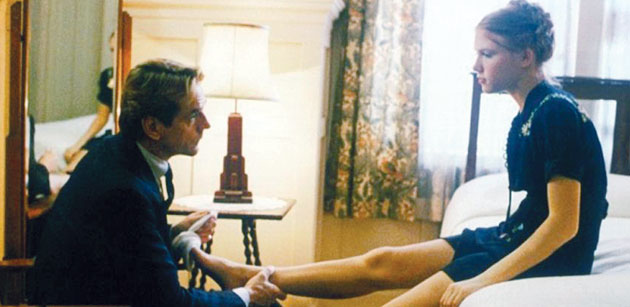Lolita
Critique • Quotes • At the movies
 First U.S. edition 1958
First U.S. edition 1958First publication
1955, France
First U.S. publication
1958
Literary form
Novel
Genre
Literary
Writing language
English
Author's country
Russia, United States, Switzerland
Length
Approx. 112,000 words

Jeremy Irons as Humbert Humbert dotes on Dominique Swain as Lolita in the 1997 adaptation of Lolita.
Poor, romantic faithful Humbert
Lolita (1997): Film, 137 minutes; director Adrian Lyne; writer Stephen Schiff; featuring Jeremy Irons, Dominique Swain, Melanie Griffiths, Frank Langella
The more faithful 1997 remake of Lolita is a lovely little film—which may be to blame for its failure to reach a wider audience.
People didn't really want a lovely story of a pedophiliac predator. And they probably didn't want to see the predator played by the handsome, likable Jeremy Irons, known for his sensitive, romantic leads in Brideshead Revisited and The French Lieutenant's Woman.
Those who (incorrectly) criticized the novel Lolita for normalizing pedophilia would double down on the film after viewing all those lovingly shot scenes of the apparent romance of Humbert Humbert (Irons) and his Lolita (Dominique Swain, playing fourteen). They wouldn't grasp that we're seeing it through the twisted mind of the predator. And the last scene in which he realizes the evil he had committed in stealing a woman's childhood comes too late and is too slight.
Reading the book in Humbert's ironic voice you get a better sense of the man's self-awareness and of his unreliability as a narrator. You can more easily distance yourself from his behaviour. The brief voice-overs in the 1997 film cannot really perform the same function. Irons does an amazing job of performing the role as if it came naturally to him. His vulnerability enlists our sympathy. We're actually sorry when the girl escapes his clutches.
Humbert, Lolita and Charlotte (Melanie Griffiths) on the porch in the remake of Lolita.
As an actress, the sixteen-year-old Swain is relatively inexperienced at this point, though her character is assuredly anything but. She rather brilliantly portrays the gum-popping, movie-star mad teenager of the late 1940s who provokes Humbert and knows how to use sex to twist him around her finger. (More ammunition for critics of the film—implying she's to blame or at least partly responsible for their illicit relationship. But remember, this is how he sees it.)
Of special note (as for almost everything he's in) is Frank Langella as the playwright and child pornographer Clare Quilty. Langella is another actor known for romantic leads in his younger years (The Mark of Zorro and 1979's Dracula), but is properly shadowy, seedy and finally revolting as Humbert's nemesis.
Quilty's shooting after Humbert finds out Lolita never loved him and had ran off with Quilty (the only man, she says, she was ever crazy about) is a highlight of the film.
The film's plot follows the novel much more closely than the 1962 movie (odd, given that the earlier script was written, at least initially, by the book's author). But it knocks off the hard edges its own way, filming lushly and much of it with a soft focus kind of golden glow. It's also missing—perhaps necessarily—the humour and word play of Humbert's narration that makes much of the book so entertaining.
But on its own, without comparison to other tellings of the story, 1997's Lolita is a lovely little film about a deluded pedophile's remembered romance.
— Eric
Critique • Quotes • At the movies
1962, 1997

